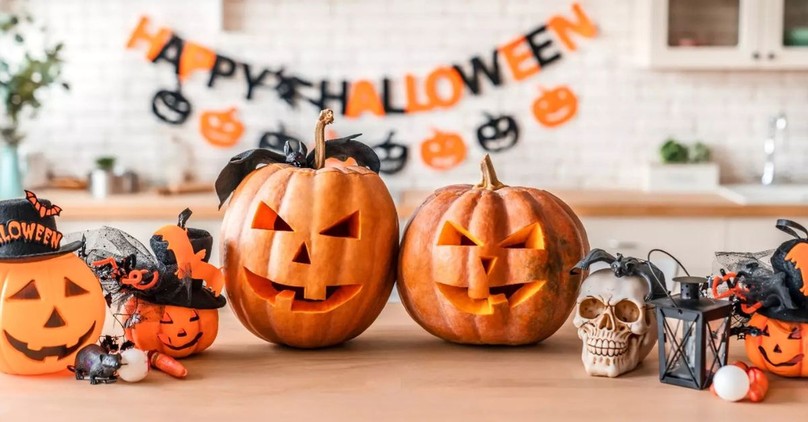
Halloween is a dark holiday full of dark symbolism, spiritual warfare, and sometimes horrific acts. Even though those around us embrace the holiday, we don’t have to. Instead, this can be a holiday and season where we can shine light brightly into the darkness.
Understanding Halloween: Origins and Modern Practices
Halloween’s origins go back to ancient Celtic festivals, specifically Samhain, which marked the end of the harvest season and the beginning of winter. People celebrated this festival from October 31st to November 1st. The Celts believed that the line between the living and the dead was blurred on the night of October 31st, allowing spirits to roam. During the festival, people would dress in costumes and light bonfires to appease the spirits and protect themselves.
Most of our modern practices have roots in the origins of Halloween. In the early days of trick-or-treating, poor people would go from door to door to offer prayers for those who died in exchange for food. It wasn’t until the 19th century that this evolved in North America to the tradition of kids dressing in costumes in search of candy from neighbors.
The Spiritual Significance of Light in Darkness
There is much spiritual significance to Halloween, including light versus darkness.
- Light as Divine Presence: In the Bible, light represents God’s presence and power. In Genesis, it says that God declared, “Let there be light,” which illuminated the universe and embodied divine creativity. Light is also associated with guidance and truth.
- Darkness as Oppression and Sin: Darkness symbolizes spiritual blindness, ignorance, and moral decay in scripture. John 1:5 (NLT) says, “The light shines in the darkness, and the darkness can never extinguish it.” This shows that while darkness may try to hide goodness and truth, it can’t snuff out holy light and truth.
- The Jesus and Light Metaphor: Jesus is the ultimate manifestation of light. John 8:12 (NLT) says, “Jesus spoke to the people once more and said, 'I am the light of the world. If you follow me, you won’t have to walk in darkness, because you will have the light that leads to life.” When we love and follow Jesus, we know he will always light the way.
Light also played a role in early Halloween traditions. People said carved pumpkins with candles in them ward off evil spirits. This echoes the Bible, where light is used to protect against darkness. Therefore, lighting decorating can invite light into the world and pull back the shadows.
What Does the Bible Say About Halloween?
Halloween is a somewhat controversial holiday that evokes excitement and fear. Debates about its origins and practices often lead Christians to question its compatibility with their faith. Although the Bible doesn’t reference Halloween, as the holiday was developed centuries after Scripture was completed, some Scriptural perspectives on Halloween include: Even though the Bible does not mention Halloween, because the holiday developed centuries after the completion of Scripture, some Scriptural perspectives on Halloween are:
- Deuteronomy 1:10-12 (NLT) says: “For example, never sacrifice your son or daughter as a burnt offering. And do not let your people practice fortune-telling, or use sorcery, or interpret omens, or engage in witchcraft, or cast spells, or function as mediums or psychics, or call forth spirits of the dead. Anyone who does these things is detestable to the Lord. Because the other nations have done these detestable things, the Lord your God will drive them out ahead of you.
- Ephesians 5:11 (NLT) says: “Take no part in worthless deeds of evil and darkness; instead, expose them.”
- Romans 14:5-6 (NLT) says: In the same way, some think one day is more holy than another, while others think every day is alike. You should each be convinced that whatever day you choose is acceptable. Those who worship the Lord on a special day do it to honor him. Those who eat any kind of food do so to praise the Lord, since they give thanks to God before eating. And those who refuse to eat certain foods also want to please God and give thanks to the Lord.
These three verses tell us these things regarding Halloween:
- We are not to take part in any kind of witchcraft or Satanic things.
- We are to expose those who do evil things in a godly fashion.
- Christians can choose to participate in or abstain from Halloween based on their conscience.
Creative Alternatives to Traditional Halloween Activities
For those who choose not to participate in Halloween, there are other family-friendly events and activities you can join in. Some ideas include;
- Go to a harvest festival
- Help with the harvest festival at your church.
- Have a pumpkin carving contest
- Make fall or Thanksgiving crafts for November
- Have a baking contest with friends and family
- Binge-watch your favorite Christian movies
Engaging Your Community Through Outreach Programs
Another way to shine God’s light during Halloween is to engage with your community through outreach programs. Some ways you can do this are:
- Organize or take part in a Trunk-or-Treat.
- Neighborhood Clean-Up Initiatives
- Organize a ‘Hope for Harvest Food Drive. This is a great way to celebrate abundance and gratitude while sharing with others.
- Host a Community Block Party
- See what kind of outreach programs your church has and get involved.
Discerning Between Fun and Fear: Navigating Halloween Symbolism
There are a lot of spooky symbolism themes with the Halloween season. Here are some ways to approach these themes thoughtfully and responsibly without compromising your beliefs.
- If you’re invited to a costume party, dress as your favorite Bible character, choosing themes of kindness, love, bravery, and positive attributes over darker themes in the Bible.
- Going to harvest festivals, trick-or-treating, and pumpkin carving spark joy in people of all ages, rather than fear and darker elements.
- Incorporate as much faith as possible, including scriptures, themes of gratitude and light versus darkness, and celebrating God’s creation.
- Understand Halloween symbols and what they mean.
- Evaluate what is entertaining versus fearful to discern if a narrative aligns with Christ-centered values. For example, It’s The Great Pumpkin, Charlie Brown is way more fun than the latest horror film. Staying home on Halloween is better than going to a haunted house, which can trigger fear and anxiety, two things God does not want us to live with.
- Create alternative traditions of faith and fun.
How to Engage with Halloween Responsibly
- Inclusive Participation: When Halloween loses its fear factor, everyone can join in.
- Conversations with Children: Parents are important in guiding their children in Halloween discussions. Having open conversations about the origins of Halloween, fun versus fearful, and reinforcing your core beliefs will help kids navigate this dark season with clarity and confidence.
Choosing Media Wisely: Parents need to be extra vigilant about the books, movies, and music this time of year. Choose age-appropriate entertainment with stories about bravery, friendship, and moral values.
Celebrating Reformation Day: A Powerful Alternative
One powerful alternative to celebrating Halloween is to celebrate Reformation Day instead. Reformation Day commemorates the historic moment in 1517 when Martin Luther, a German monk and theologian, nailed his “Ninety-Five Theses” to the door of the Castle Church in Wittenberg. This catalyzed the Protestant Reformation, a movement that sought to reform the Roman Catholic Church’s practices and beliefs.
At its heart, the Reformation was about spiritual renewal-awakening to biblical truth and pursuing a relationship with God, free from institutionalized religion. Therefore, this day serves as a reminder of the bravery of Martin Luther, who fought against corruption, advocated for accessibility of the Scriptures, and ignited a quest for faith, reshaping Christianity.
Where Halloween celebrates the dark, Reformation Day celebrates the light. Still, there are many ways to honor these traditions without overlapping.
- Themed Educational Events: Talk about the meaning and history of Reformation Day.
- A Day of Reflection: Carve out Bible reading, prayer, and reflection time.
- Attend a harvest festival.
- Engage in the fun traditions of Halloween, like trick-or-treating and pumpkin carving.
Do community service in the spirit of Reformation Day.
Creating a Safe and Welcoming Environment for Trick-or-Treaters
Halloween is dark enough, so creating a welcoming environment for trick-or-treaters is essential. These days, you don’t know who will show up on either side of the door, so creating a bright environment is essential. Here are some tips to do this:
- Ensure pathways are well-lit
- Secure your property (look for hazards and obstacles like garden hoses, outdoor furniture, etc.).
- Consider food allergies: As a former daycare teacher, I can’t tell you how many kids have allergies. Instead of candy, hand out small toys, stickers, or even cans of Playdough.
- Play cheerful or kid-themed Halloween music.
- Wrap a note of kindness or a Bible verse around your candies to add warmth to the holiday.
Demonstrate a spirit of joy and goodwill.
Teaching Children About Faith Amid Halloween Festivities
Although Halloween straddles the fine line between fun (trick-or-treating) and darkness (haunted houses, horror movies), talking to kids about faith during this dark season is still important. Here are some ways to do this.
- Educate kids on the origins of Halloween in an age-appropriate manner.
- Define Your Family’s Faith Perspective: Talk to your kids about creation, the role of good vs. evil, and faith in celebration.
- Prioritize Meaningful Engagement: Choose Bible-based costumes and faith-themed activities.
- Take part in alternative activities.
- Keep dialogue open
- Reinforce boundaries: Help kids align boundaries with their faith.
Shining Your Light: Personal Testimonies of Faith During Halloween
In this season of darkness, share your personal testimony and stories of other Christians who have made a positive impact during the Halloween season. You can do this in several ways:
- Write a guest blog post about your testimony on a Christian website (or your own).
- Strike up a conversation with neighbors to see where they stand on faith and slowly but lovingly navigate things from there. You may not get to share right away, but eventually you might.
- Have a Spooklicious Shoebox party: Invite friends over on Halloween and stuff shoeboxes for Operation Christmas Child. Talk about your faith journey, how the Lord has protected you from evil, and other Christians who inspire you. Add finger food, snacks, drinks, and dessert for this party's ‘delicious’ part.
There are many ways Christians can shine their light this Halloween season, bringing light into the darkness on the darkest night of the year. Start planning how you are going to show and share your light today.
Photo credit: ©Getty Images/Inside Creative House









